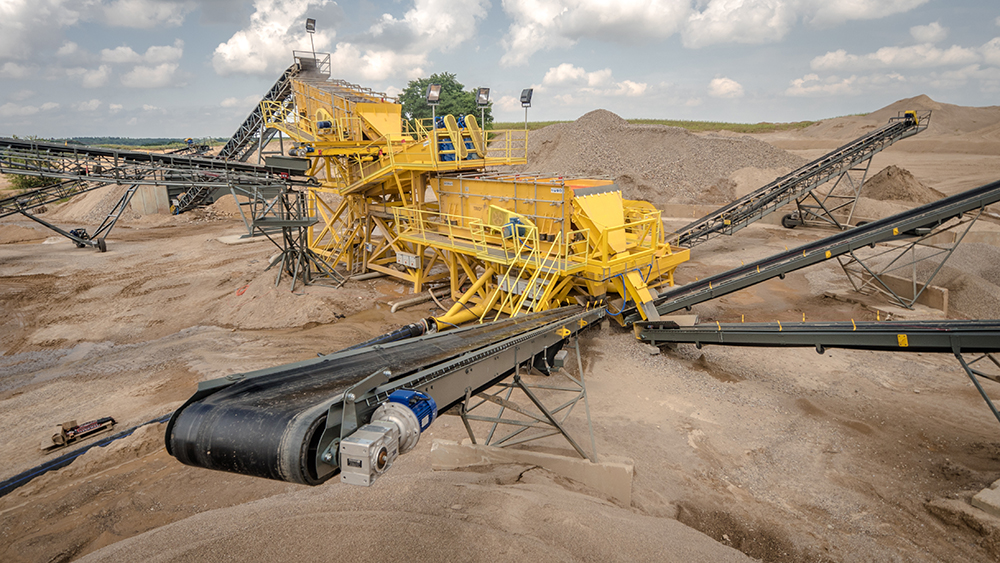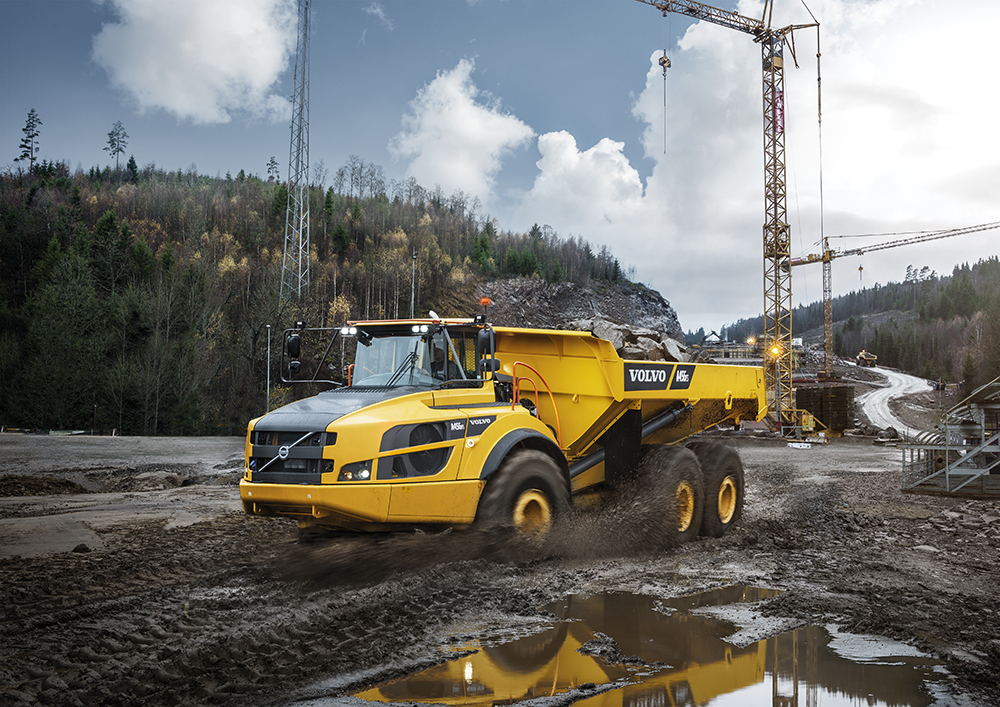
Demand for aggregates in some Eastern Europe countries is up about 30% on last year and is anticipated to rise by the same amount in 2022. This means that the quarrying and aggregates business within Eastern Europe has many opportunities for equipment companies, according to Bruce Cooke, head of product management and comminution at Weir Minerals Europe.
“The Ukraine, for example, has around 150 aggregate sites currently in operation,” says Cooke.
He adds that there is a great deal of investment in upgrading infrastructure within the region, which is seeing a growing demand for sand and aggregates within a variety of applications.
A lot of this planned upgrading is largely funded by the EU, with its focus on the circular economy. The EU is pushing targets to decrease the amount of construction and demolition (C&D) waste and to look at ways in which recycled and recyclable material can be used.
“We are seeing an increase in the use of recycled sand and aggregates within Eastern Europe thanks to infrastructure projects in the region,” Cooke says. “Recycled sand and aggregates are being used in non-structural concrete and asphalt in low-loading applications. This growing trend has many opportunities for companies in the region.”
Recycled aggregates is not an area that is well developed in the Ukraine and Central Balkans, according to Cooke, and is being run at a small local level with companies using mobile crushing and screening plants.
He adds that sand and aggregates businesses in the region’s construction and asphalt markets are utilising Weir Minerals’ equipment across their entire process; from sand washing through to recycling.
“In countries such as the Ukraine, old technologies are still in operation on some sites, and there is a drive to replace with modern equipment such as the Trio TP series of crushers available from Weir Minerals,” says Cooke.
Weir Minerals works closely with sand and aggregates firms across the spectrum and is supporting Eastern European countries with everything from large-scale plants to more modular equipment depending on the requirements of its customers in the region.
In 2020 there were drastic slowdowns in demand for aggregates in some Eastern European markets but in others construction and infrastructure projects actually increased, according to Stefan Lind, commercial manager for Central & Eastern Europe at Volvo Construction Equipment (CE).
“This year, the market has been improving and the outlook is good,” says Lind. “The demand for aggregates more or less follows the level of construction and infrastructure work because the materials are destined for projects locally.”
He says aggregates and quarrying customers in Eastern Europe are increasingly asking for Volvo CE to bundle its machines and services offerings (including digital services, operator training and consultancy) into one cohesive solution to meet their needs.
“Both large key accounts in Eastern Europe and small local quarry operators are looking to boost productivity, decrease cost and reduce CO2 emissions,” he adds.
Demand levels vary hugely across countries, both for virgin and recycled aggregates, according to Cooke of Weir Minerals. He says that countries such as Poland and Czech Republic are now looking more at the circular economy and how recycled aggregates can be used within industrial applications.
“Poland, for example, is seeing a higher growth in recycling than with virgin products, whereas Hungary’s demand is still for virgin sand and aggregates,” Cooke says. “Construction and infrastructure projects remain major drivers for sand and aggregates and for concrete and asphalt and the latter is in particularly high demand.”
He adds that in Ukraine there is a high demand for aggregates due to the ‘Big Construction Programme’ to modernise the country’s infrastructure, which is being heavily supported by the Ukrainian Government and president Volodymyr Zelensky.
Although the state agency in Russia, Rosstat, indicated a reduction in the volume of aggregates production by 2% in 2021 compared with the same period in 2020, Russia remains the largest producer of quarried material in eastern Europe. Cooke says that, like Ukraine, Russia has many sites still operating old technologies, for which Weir Minerals can supply more efficient solutions.
Eastern Europe’s construction industry is forecast to grow by 3.6% in full-year 2021, following a 1.6% contraction in 2020 due to the COVID-19 outbreak and subsequent lockdown restrictions, according to data and analytics company GlobalData.
GlobalData says that vaccination rollout programmes across the region and the lifting of lockdown measures should allow for a strong economic recovery in the second half of the year.
The impact of COVID-19 created a varied picture across the region. In Romania and Estonia, construction output grew by 10.2% and 6.8% in 2020, while Hungary and Azerbaijan output contracted sharply by 9.4% and 15.2%, respectively.
Moustafa Ali, economist at GlobalData, comments: “A significant upside for the industry this year is fiscal support from the EU through the recovery funds, which is expected to support growth in the EU’s Eastern bloc.”
He added that the Russian construction industry will be supported by the recovery in oil prices, which will bolster government finances to help support investments in transport infrastructure projects. Russia’s construction industry is predicted by GlobalData to expand by 2.6% in 2021.
Wet processing and aggregates recycling solutions provider CDE says it is currently experiencing increasing interest in recycling solutions for construction and demolition waste, especially in countries such as Czech Republic, Slovakia and Romania.
Stefan Hunger, CDE regional manager for Europe and Russia, says that levels of aggregates recycling vary across different countries in eastern Europe. “The general underlying factor is, however, driven mainly by financial factors such as return on investment and resource availability,” he adds.
“In some countries it is still not financially worthwhile to attempt using products from secondary resources as other sources are cheaper or even more easily available. The legislative framework that encourages recycling activities are not yet as developed as in other parts of Europe where the general rule is that if it is technically possible to recycle a material stream, then it is not permitted to landfill that material.”
Two of Terex Materials Processing’s businesses, ProStack and EvoQuip, have made new dealer appointments in eastern Europe. Severmek has been appointed as the latest distributor for ProStack equipment in Russia.
The distributor will represent the full ProStack portfolio of bulk material-handling and product stockpiling conveying equipment across the country. The partnership was launched at the Neva Exhibition and Conference 2021, held in St Petersburg, Russia, in September.
ProStack offers a portfolio of products to address the needs of the bulk material-handling and product stockpiling markets. Key markets and applications include aggregates, ports and terminals, mining, recycling, agriculture and other bulk material-handling industries.
The range of ProStack machines includes tracked and telescopic conveyors, bulk reception feeders and the recently launched range of port hoppers.
Severmek is a longstanding company and a supplier of transhipment and ship-loading equipment.
Lee Nesbitt, ProStack global sales manager, said: “Severmek are the ideal distributor for ProStack. They have years of experience in the industry and I know they will help grow and nurture the ProStack brand. The current offerings Severmek provide complement our products and I believe that this is going to be a long and successful partnership.”
Rimantas Verbliugevicˇius, general manager of Severmek, commented on the link-up with ProStack: “They are a premium brand with quality equipment which we are excited to bring to the Russian market. I have no doubt that our new and existing customers will strengthen their operations with this world-class equipment."
In addition to sales opportunities, Severmek will provide parts, service and warranty support for ProStack equipment by factory-trained technicians. Financing options will also be available to qualified customers.
Meanwhile, EvoQuip has appointed RM Technik as its authorised distributor for Hungary.
RM Technik will supply the full range of EvoQuip equipment including compact crushing, screening and conveying equipment, genuine spare parts, and machinery maintenance throughout the country.
RM Technik was formed in 2019 and offers an entire solution to customers who may have multiple requirements. The company has a team of specialists with years of experience in the crushing and screening industry.

Jamie Mairs, EvoQuip territory manager, commented: “RM Technik are a welcome addition to the EvoQuip family and we are excited to have them on board. Their experience will support our domination of the compact crushing and screening market in Hungary.”
Sándor Gárdonyi, sales director for RM Technik, added: “EvoQuip have an impressive portfolio of machines and services that we feel will suit the Hungarian market well and allow our customers to enhance their operations, creating a more profitable outcome.”
In terms of trends in the region’s quarrying and aggregates markets over the next 18 months, CDE’s Hunger says: “Reprocessing wastes and turning construction and demolition waste into high-quality products is one of the major developments expected in Eastern Europe.”
Lind of Volvo CE says he expects the regional market to continue to increase for the next 18 months with different levels in different countries.
“This may be 3-10% depending on the country,” he adds. “However, the main development we expect to see is the increasing focus by customers on productivity, cost and CO2 reduction and our provision of a total solution encompassing digital, training or consultancy services as well as machines to meet their business goals.”
Cooke of Weir Minerals says the EU is collaborating with agencies in eastern European countries where recycling is more advanced to look at potential opportunities for a higher percentage of material to be used in structural concrete applications. “This process is unlikely to be a short-term gain, but we believe that the migration will take place over the next five years,” he adds.
“The Big Construction Programme in the Ukraine will be completed over the next 18 months and following this, we anticipate consumption of aggregates will decrease by at least 50% of its current demand.” AB








